
The Top 25 Films of the 1990s
page 3

The Top 25 Films of the 1990s
page 3
I don't like prison movies. Malice, injustice, brutality, and indignity just don't appeal to me. However, no other movie has so thoroughly surprised me before or since. The Shawshank Redemption endures because of its unabashed portrayal of friendship between men. Tim Robbins and Morgan Freeman have fearlessly created characters who hold a deep, loving affection for each other. Theirs is a relationship that I've never witnessed in real life, although I long to believe that such honest bonds can exist between men. I certainly haven't seen anything like it in the movies.
I've seen countless stories of men reluctantly bonding after some wild escapade, but I can't remember another movie in which the male leads meet and discover an instant affinity for one another, one that naturally deepens into a true, abiding love. This relationship is precious because it is so rarely seen. It stands out in high relief against the bleak, harsh backdrop of the prison yard, and is propelled by an emotionally moving story. –Jen
|
Academy Awards™ Other Major Awards |
 |
#18 Glengarry Glen Ross (1992) Starring Jack Lemmon, Al Pacino, Ed Harris, Alan Arkin,
Kevin Spacey, Jonathan Pryce, and Alex Baldwin. |
|
||||||||||||||
Words are weapons in Glengarry Glen Ross. The salesmen inhabiting the shabby office of Premier Real Estate stab each other with invective and lay traps for their customers with their circumlocution. Every conversation is a sale. Every wheedle has a winner. David Mamet's brilliant dialogue sashays rhythmically from actor to actor. You don't even need to know the words to feel the energy and the bitterness behind them. These salesmen are trapped in traditional male modes of expression and desire that seem brutal and archaic. Rejecting ethics is the only way for them to get ahead.
The ensemble cast is flat-out amazing. Al Pacino gives his best work of the decade as the suave cajoler Ricky Roma. Jack Lemmon thrives as the desperate Shelley Levene, going from meek to mean in instants. Alec Baldwin justifies his entire career with a five-minute monologue that is the epitome of dick-swinging bombast. Kevin Spacey's venal office manager suffers enormous verbal abuse, which he earns with malicious glee. Every scene is a tour-de-force in acting, making the film enormously entertaining. James Foley's camera fluidly follows the barbs and back-stabbing. The film has an atmosphere of weary persistence, like the fighter who refuses to stay down when he knows he's beat. Glengarry Glen Ross is a fascinating place to visit for 100 minutes, but I wouldn't want to live there. –Jeff
|
Academy Awards™ Other Major Awards |
 |
Starring Matthew Broderick, Reese Witherspoon, Chris
Klein, Jessica Campbell, Mark Harelik, Molly Hagan, and Frankie Ingrassia. |
|
||||||||||||||
A spirited comedic gem, Election delivers on the promise shown by director Alexander Payne in his previous film, Citizen Ruth. Less openly satirical than its predecessor, Election manages to walk that most difficult of tightropes, simultaneously poking fun while sympathizing with its hopelessly compulsive characters. Witherspoon goes full bore as the hyper-competitive candidate for president of her high-school class, while Broderick reigns in his usual mannerisms as the beaten down, sexually misdirected teacher increasingly driven to thwart the ambitions of his star pupil. They are joined by a stellar supporting cast, including Chris Klein and Jessica Campbell.
The performances notwithstanding, the movie's heart is in the palpable sense of enjoyment taken by Payne in his characters' foibles: here freezing the camera at a particularly unflattering angle of Witherspoon's cocksure expression, there dressing her up in curlers and a frumpy nightgown as she berates fellow students for keeping her awake after hours. Election is one of those movies that takes about two minutes to establish that your $8 was well spent, and it keeps getting better from there. –Kris
|
Academy Awards™ Other Major Awards |
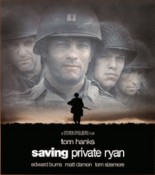 |
#20 Saving Private Ryan (1998) Starring Tom Hanks, Tom Sizemore, Edward Burns, Barry
Pepper, Giovanni Ribisi, Jeremy Davies, and Matt Damon. |
|
||||||||||||||
Saving Private Ryan is a small story set against the epic canvas of World War Two. Having just survived the decimation at Omaha Beach, eight American soldiers are sent in search of the sole surviving son from an Iowa family. The mission is a high-minded gesture from the top. As such, it serves as an allegory to the grand gesture of waging war itself, pitting the big picture against the small.
Meticulously staged and shot, Saving Private Ryan captures the insanity of combat with bracing immediacy. By setting this tale around D-Day, Spielberg challenges the mythos of the "Good War" and exposes the fraudulent portrait of heroics promulgated by conventional WWII films. Death comes by chance, by mistakes made, by running out of ammunition or showing compassion. Survival happens by luck, not valor.
Saving Private Ryan takes the soldiers’ perspective, which makes it brutal and heartbreaking. It's beloved by historians and especially by veterans of the war, whose sacrifices it honors by telling the truth. Noble intent does not make carnage pristine or moral. Heroism is nothing more or less than having the will to go on. Combat makes you less of a man, not more of one. And though there may be good causes, there's no such thing as a Good War. –Dana
|
Academy Awards™ Other Major Awards
|
 |
Starring Kevin Spacey, Annette Bening, Thora Birch, Wes
Bentley, Mena Suvari, Chris Cooper, and Peter Gallagher. |
|
||||||||||||||
The notion that "appearances can be deceiving" is a central theme of American Beauty, and it also describes the film. On its surface, Sam Mendes’ directorial debut is a darkly comic social satire about the spiritual void engendered by embracing hollow values. Ultimately, it metamorphoses into a compassionate meditation on the depth and beauty of the ordinary struggles of ordinary people to find themselves, to connect to one another, and to see this messy world for the palace of wonders that it is.
Kevin Spacey gives a brilliant performance as Lester Burnham, an affluent suburbanite who has become uncomfortably numb to the experience of being alive. Just as his capacity to truly engage with the world is resurrected, that world is crumbling around him. A magnificent ensemble cast brings various facets of soul-crushing fear and self-loathing to vivid life. Elegant and gorgeous in its careful progression from satire to poignant drama, American Beauty celebrates the rewards of the journey instead of glorifying the destination or the prize. And unlike some similarly lofty fare, it's not afraid to entertain along the way. Perfectly distilling the end-of-millennium zeitgeist, its empathic embrace of our collective absurdities imbues it with an irresistible beauty all its own. –Dana
Read Vornporn's full-length review.
|
Academy Awards™ Other Major Awards |
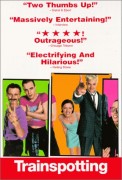 |
Starring Ewan McGregor, Jonny Lee Miller, Robert Carlyle,
Ewen Bremner, Kevin McKidd, and Kelly MacDonald. |
|
||||||||||||||
From Scotland, Trainspotting is a spirited, energetic, hilarious take on one of the least spirited, energetic, or hilarious topics of all: heroin addition. Or at least, so addiction would seem to us outsiders. Trainspotting is one of the few films that tells its story not from the detached, finger-waggling point of view of someone who knows better, but from the perspective of the addicts themselves. "People think it's all about misery and desperation and death," says Renton (McGregor). "But what they forget is the pleasure of it. Otherwise, we wouldn't do it! After all, we're not fecking stew-pid, you know."
Though it dares to admit drugs feel good, there's no mistaking Trainspotting's anti-drug position. It makes its point not by lecturing, but by focusing on its unforgettable characters–Renton, scrawny Spud (Bremner), Sean Connery-fanatic Sick Boy (Miller), ill-fated Tommy (McKidd), and psychotic drunkard Begbie (Carlyle). In a series of visually inventive, in-your-face, tragicomic vignettes, including one about the worst toilet in Scotland, director Danny Boyle sketches out their lives as an endless circle of addiction, recovery, and relapse. Heroin is their dead-end escape from their dead-end lives in economically depressed Scotland, but can they escape from heroin's inviting, deadly embrace? –Carlo
|
Academy Awards™ Other Major Awards |
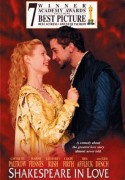 |
#23 Shakespeare in Love (1998) Starring Gwyneth Paltrow, Joseph Fiennes, Geoffrey Rush,
Judi Dench, Ben Affleck, and Colin Firth. |
|
||||||||||||||
Anchored by an utterly charming and unapologetically swoony romantic fantasy, Shakespeare in Love is an energetic, joyous celebration of love, art, language, and the creative process. Fiennes and Paltrow are perfect as Shakespeare and his muse, both of them simmering with passion and sweetness in equal measure. The screenplay is a marvel, infusing a simple story with the sort of layered density that Shakespeare himself employed. While the foreground focuses on the struggle to bring a play to life, the background provides glimpses of the human longings that fuel such creation.
Many were shocked when it won Best Picture, but they shouldn't have been. Its wry observations about show business and the mysterious nature of creative synergy serve as a rapturous love letter to the writers, actors, and craftsmen whose votes put statuettes in hands. While its romantic fantasy warms the heart, its creative fantasy is the Holy Grail of artists everywhere: audiences will love your work, tough critics will embrace it, and the financier will grow to love it more than he loves his money. Surely that's the only fantasy as alluring and elusive as perfect love. Shakespeare in Love provides both fantasies, weaving them together with sublime precision and tremendous joie de vivre. –Dana
Read Carlo's full-length review.
|
Academy Awards™ Other Major Awards
|
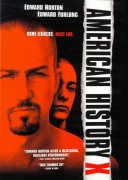 |
Starring Edward Norton, Edward Furlong, Beverly D'Angelo,
Jennifer Lien, Fairuza Balk, Avery Brooks, and Stacy Keach. |
|
||||||||||||||
American History X is an object lesson in stark black and white of how hate destroys. It destroys not only its object, but its subject, as well. Edward Norton’s Derek Vinyard is that subject, a muscular, graffitied advertisement for vitriol, in a performance of harrowing power and striking depth. Derek’s story is a classical tragedy in very modern trappings. His fatal flaw–inexorable rage for all that he cannot control in his world and poisonous hatred for those he holds responsible–precipitates his downfall and the destruction of all that he holds dear, despite his efforts at redemption.
Told in flashback from the point of view of Derek’s hero-worshipping younger brother Danny (Furlong), American History X unflinchingly follows Derek’s rise to the leadership of a misdirected group of racist skinheads under the tutelage of a creepy white supremacist (Keach). Derek is smart, unrelenting, charismatic, and exceedingly frightening. The film’s power as an anti-racist statement is so strong in part because Derek is so persuasive and even seductive before the full scope and effect of his wrath is known.
The consequences of Derek’s beliefs and actions born of his unstemmed fury leave little room to doubt the film’s strong message, however. Rage of this magnitude is an opened artery and a band-aid cannot stanch its flow. –Alison
Read Carlo's full-length review.
|
Academy Awards™ Other Major Awards |
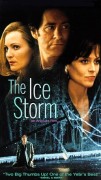 |
Starring Kevin Kline, Joan Allen, Sigourney Weaver, Christina
Ricci, Tobey Maguire, Henry Czerny, and Elijah Wood. |
|
||||||||||||||
Set in suburban Connecticut circa 1974, The Ice Storm examines the socio-political angst of post-Vietnam America in coming to terms with the increasing cynicism and malaise embodied by the Watergate scandal, while at the same time exploring the tension between the growing sexual liberation of the era and the desire to maintain the traditional family structure. No, wait, that would be another, much more boring, movie. The Ice Storm is one of the best films of the past decade not so much for its value as a cultural statement but because it exists off on its own aesthetic plane, from the prolonged grinding of ice along the railroad tracks in the opening scene through the quiet, haunting cinematography of the storm's aftermath. The mood of the film is best captured by the time of year in which it take place–late November–rather than through the specific geography or politics of its setting. As such, it is timeless. The understated, melancholy score by Mychael Danna blends perfectly with the scenery, and the writing and acting are also terrific. These are real, fully rounded characters we're watching up there, one of the many reasons The Ice Storm stands up to repeat viewings, and seems to get better each time. –Kris
|
Major Awards
|
|
|

|